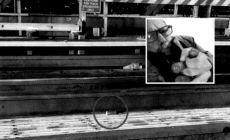-
Iran Considers Leaving Nuclear Treaty if Snapback Sanctions Triggered - 33 mins ago
-
JD Vance Knows Who Belongs - 46 mins ago
-
Newsom redistricting threat fits a pattern of ignoring voters - about 1 hour ago
-
Americans Face $110,000 Earnings Loss to Prop Up Social Security - about 1 hour ago
-
Ozzy Osbourne’s Death Draws Mourners, Including Drake, to the ‘Home of Heavy Metal’ - about 1 hour ago
-
Kohl’s Shares Skyrocket Despite Company’s Struggles - 2 hours ago
-
David Geffen accused of abusing husband in shocking lawsuit - 2 hours ago
-
Louis Vuitton Netherlands Entangled in Money-Laundering Case - 2 hours ago
-
Long Island Man Threw IED Onto New York Subway Tracks: Prosecutors - 2 hours ago
-
Latino tenants sued their landlord. A lawyer told them they would be ‘picked up by ICE.’ - 3 hours ago
Man Captures ‘Surreal’ Moment He Spots Bear and Cubs Camping in Alaska
While camping along a remote stretch of Alaska’s coastline, photographer and professional bear guide Casey Cooper experienced a rare and intimate moment with one of the state’s most powerful predators—and lived to tell the tale.
Cooper, known as @cooperlost on TikTok, shared footage of the encounter in a TikTok video posted June 27. In the clip, a brown bear walks along a beach at sunset with her three cubs in tow, passing within feet of Cooper.
The video, overlaid with a caption saying “brown bear brings her cubs right next to me,” has since racked up more than 6.3 million views.
Cooper told Newsweek the moment occurred about a month ago “on ‘the bear coast’ west of Kodiak island.”
Cooper, who has led tours for bear viewing for over a decade, said he usually takes great care to avoid such close-range contact. “It is important for viewers to know being this close to bears is incredibly dangerous without knowledge of these creatures,” he said.

@cooperlost on TikTok
“Camping in back country of Alaska, I walked down to the beach, sat down to watch the sunset,” Cooper wrote in the TikTok post’s caption. “Looked to my left and this beautiful brown bear and her three cubs were walking right up to me. I didn’t want to startle her but I made sure she knew I was there and let her walk right by me.”
The footage shows the mother bear glancing toward the camera, letting out a few soft chuffing sounds before her three cubs trot into view. One curious cub briefly approaches Cooper before darting away to rejoin the others.
Brown bears, often referred to as grizzlies in Alaska, are found throughout much of the state, with notable concentrations along its southern coast. These bears are drawn to areas where food is plentiful, such as salmon streams and coastal vegetation zones, according to the Alaska Department of Fish and Game. While typically solitary, they are known to gather in large groups when resources are abundant.
“In many parts of Alaska, brown bears are capable predators of moose and caribou, especially newborns,” the department notes. “They may also be attracted to human camps and homes by improperly stored food and garbage.”
Though he has over 10 years of bear guiding experience, Cooper emphasized that the experience wasn’t planned. “I was with friends on a bear viewing conservation camping trip, raising funds for brown bears research,” he said. “But in this particular moment I wasn’t planning on seeing a bear. I was just on the beach watching the sunset during low tide and she came from behind the logs and grass. By the time I noticed her it was too late to get up and move away.”
Rather than risk startling the bear or her cubs, Cooper remained still. “I let the encounter take place while making noises so that she was aware of my presence,” he said. “It was just a beautiful moment, the sun was setting, she was relaxed by me and so were the cubs. It’s not a circumstance I would ever try to recreate.”
Anyone looking to see bears in Alaska should go with skilled guides with years of experience, Cooper advised. “This is one of the only places in the world where you can have encounters like this and have it not be a deadly situation,” he said.
“This bear in particular is habituated and comfortable with human presence,” he said. “A mother bear of any species is likely to injure or kill a person in this proximity of their cubs.”
Reflecting on the experience, Cooper said it left a lasting impression. “It was just amazing being there and seeing these bears walk on the beach in beautiful light in one of the most remote places left on the planet,” he noted, adding that “it was a surreal moment that will be with me for the rest of my life.”
Do you have a travel-related video or story to share? Let us know via life@newsweek.com and your story could be featured on Newsweek.
Source link


















